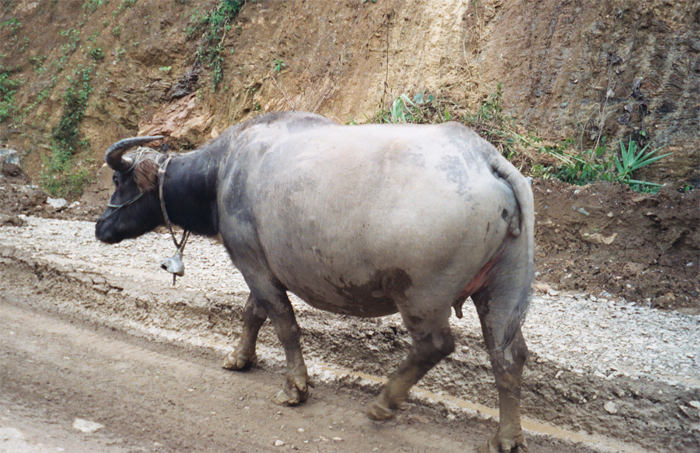by William F. S. Miles (July 2020)
Blauer Kegelberg, Gabriele Münter, 1930
“Is your boss a Communist?” I ask my 26-year-old Buddhist monk tour guide, Boumyang. The sentence itself is so remote from any other that I have ever uttered that my tongue and lips still tingle from the strange combination that they produce.
Almost stranger is the matter-of-fact nod and “Yes” that my boyish guide gives me in his corner of the drug-infested and semi-lawless Golden Triangle, where Thailand, Myanmar and Lao converge. We have not spoken politics once during the three days he has guided me, here in the Lao People’s Democratic Republic. If he did find my question surprising, he does not let on in the least.
“Yes,” Boumyang continues. “Before becoming tourism office manager, Bounpheng was a soldier.” With that, Boumyang confirms what I had suspected all along—that this man, in charge of a government-supervised tourism office, detested having to cater to my “capitalist” (not to mention American) self.
Bounpheng hadn’t particularly wanted to meet me before I was to depart—without a single paper signed—with his guide, car, and driver. Then he took his sweet time before coming over to his own office. Although his business is tourism, Bounpheng spoke no English or French. He never made the slightest effort to be likeable. On his beefy, taut frame with a wisp of Ho Chi Minh-like beard, he never betrayed emotion, much less a smile. It must have burned him inside to have to appear at some random American’s request. Only once did a twinge of satisfaction begin to curl the corners of his mouth. That was three days later, when I handed over to him the fee for the travel and guide services. But even that betrayal of satisfaction rapidly disappeared.
Not that my guide inspired much confidence, either. Boumyang was coming back to work after a sick leave: malaria. Nor did he seem to subscribe more to the germ theory than to the mosquito-man-malaria nexus. During a day’s jungle trek, he indiscriminately guzzled from his water bottle and mine. Basically, he was clueless. And for a guide, his English was strangely incomprehensible. Boumyang had a peculiar, seemingly lazy, eventually infuriating way of pronouncing only the first half of words: “how” instead of “house,” for instance. It kept you guessing as to the correct ending to a good half of his speech. Although in his mid-twenties, he displayed the juvenile bawdy humor of a kid half his age. Still, I was lucky to have him.
For my research I was hunting Francophones—living legacies of France’s colonial designs on Indochina. Boumyang didn’t know a bonjour from an au revoir but he did finally get what I was after. One Laotian Francophone led to another until finally I met my first victim of Communist persecution: “Namsommud,” of Lam Nam Tha.
A quarter of a century after his hard labor in a “seminary,” as it was euphemistically called, Namsommud still protests his innocence. “I nearly died,” he relates matter-of-factly. Fifty-five years old, living in the old, bombed-out section of town, he speaks with an affecting mannerism by covering his mouth with a downward-turned hand. Was it because he was speaking French, an act that was banned for fifteen years even after his release from “seminary”?
“If I was overheard doing so, I would be convoked by the police. Another year in prison. But now, ça va. When the Tourism Board needs someone to speak French, they call upon me.” Still, he nurses grievances.
“Je n’aime pas les communistes,” he boldly states, his eye darting around to ensure only family and known friends are around. “I don’t like Communists.” We are seated on the patio of his family restaurant. He has invited me for dinner and shares with me his plate of bamboo shoots. He asks his wife for une soupe chinoise. Only for the soup does he ask me to pay.
My host insists that I join him with his lau-lau—Laotian home-grown whiskey. “Only two shots,” he insists. “Pas trop. Not too much. ‘To eat well, sleep well.’” But in the end, Daolith downs double that amount. And that’s before, after taking me to his home, he insists that I simply must join him in more.
In the French West Indies I have often been taken for a European, though I am not. In Muslim West Africa I have automatically been called a Christian, though I am not that, either. This evening, in Southeast Asia, my host refers to me, if indirectly, as a Capitalist. I at first feel the same frustration of mistaken identity. But then again, if I am not a Communist, what am I?
“Before,” Daolith was saying, “if I was seen speaking to Capitalists, I would be punished. But now, ça va. It’s all right.”
Is your boss a Communist? If not, what is s/he?
Questions in Laos that can make you squirm.

«Previous Article Table of Contents Next Article»
__________________________________
William Miles writes and comments on politics and culture in the Middle East, the West Indies, and sub-Saharan Africa. He has written on ISIS’s territorial ambitions, the welfare system in the French Caribbean, and matzah smuggling in an embassy in Africa. His commentaries on public radio describe encountering Anwar Sadat’s granddaughter in a classroom, cohabiting with crocodiles in Burkina Faso, and what can happen when you fall off a motorbike in West Africa. He has also written on French influence in Israel.
Follow NER on Twitter @NERIconoclast

.JPG)
.JPG)
.JPG)
.JPG)
.JPG)







